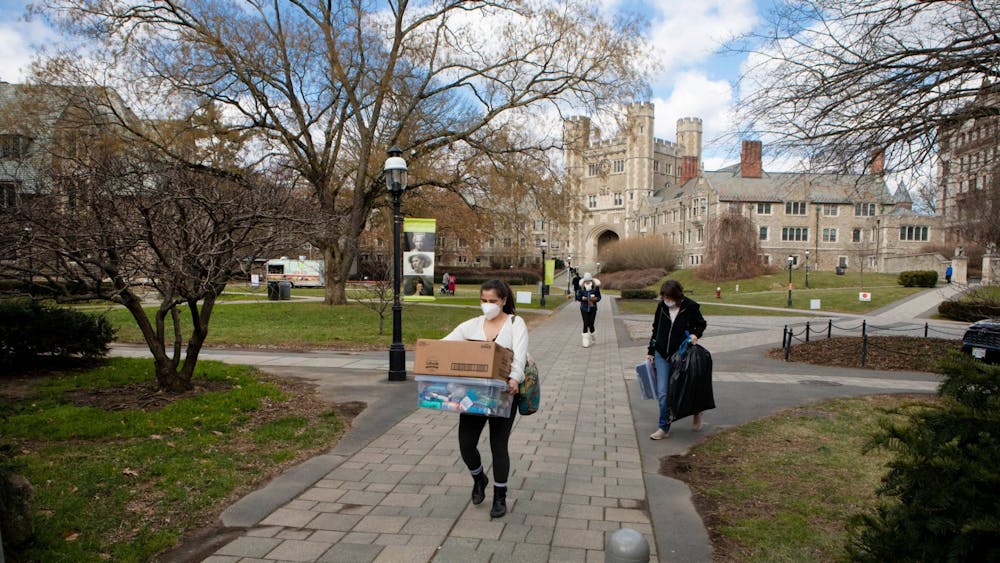With the new academic year having begun, many of us are looking for a sense of normalcy following the COVID-19 lockdowns: masks are no longer required for a majority of classes, and the utilization of Zoom meetings (for class and club purposes, at least) seems to be dwindling.
This desired sense of normalcy, however, has only existed alongside a seemingly relentless spread of COVID-19. Cases had significantly escalated on campus within the first two weeks of school. From move-in weekend to mid-September, positive cases were up to 415 in total — quite the concerning count, considering the University’s plans to shift to “pre-COVID-19 schedules” this school year.
While the reported numbers have dipped as of late, other measures need to be taken for cases not to spiral out of control again. Sustainable “pre-COVID-19 schedules” aren’t possible unless proper safety protocols are put into place. If we cannot prevent a surge in cases from just the first few weeks of the school year — and if we cannot properly take care of those in isolation so that they recover and don’t put others at risk — then a truly healthy campus may not happen any time soon.
Current housing, dining, and class protocols are all insufficient to combat the spread of COVID-19 and haven’t been properly accommodating those who are sick, exposed, or immunocompromised. For the sake of our community’s health, these components of the COVID safety procedures must be improved.
Since vaccination rates are so high and since the disease has already been so widespread, many think that contracting COVID-19 might “not be so bad” and that the symptoms are “similar to a common cold.” While this sentiment is understandable to some extent, it’s important that we prevent the spread of illnesses wherever possible and remember that the severity of symptoms is different for everyone. The University needs to provide better isolation housing options for students. Currently, the main suggestion suggests that students remain in the same living space as their roommates for isolation, even if their roommates aren’t sick, or that the healthy roommates look for alternate housing. Since finding alternate housing may serve as a clear obstacle for many, the close proximity of sick and healthy individuals should be a huge concern for the University because more people could get infected by the virus.
As Columnist Ndeye Thioubou has illustrated through her COVID-19 experience, sick individuals, in an effort to not infect their healthy roommates, shouldn’t have to go through the stress of frantically looking for housing if plans fall through or resources are inaccessible. To avoid this, the University should prioritize COVID-positive individuals rooming with other COVID-positive individuals — if possible and especially if they know each other — rather than informing them to share a living space with their healthy roommates. It’s a strategy that can be immediately implemented within the protocol and would eliminate the stress of searching for additional housing. This way, those who aren’t sick wouldn’t be put at risk by being in such close proximity with the virus, and less spaces would be contaminated.
It’s also presumptuous of the University to suggest that students take “advantage of personal off-campus alternatives.” There may be a considerable portion of the student body with permanent residences near campus, but to push this as one of the main suggestions in the protocol wrongly suggests that most students have the resources to do that.
And since the University is primarily depending on students to plan these housing procedures amongst each other, I hope Princeton doesn’t conclude that people aren’t “planning” their isolation procedures “well enough” in response to these struggles. People simply need better support and shouldn’t feel alone in this process.
Housing is not the only issue. The current dining hall setup is also ineffective in stopping the spread of COVID. Take-out containers, for one, shouldn’t have been eliminated from the dining hall program. Considering the CDC states that people who are moderately or severely ill “may remain infectious beyond 10 days,” take-out containers would be a great tool in preventing people from getting sick.
After the huge trash increase on campus from take-out-container use in the past, the University might be concerned about the waste returning to a high volume. If this is the case, then the dining halls should make take-out containers available upon request, which would deter a lot of students from using it when it’s not necessary. More importantly, though, it’d give students who need it the ability to use it.
As for classes, it’s evident that professors are not providing enough helpful alternatives for students who are isolating, immunocompromised, or just aren’t comfortable going to class amid the high rise in cases. There are no Zoom alternatives or mandate for documented lessons online. Unwell students shouldn’t have to bear the burden of missing class or finding ways to catch up when professors don’t make their course content accessible.
Zoom meetings or lecture recordings would easily remedy this issue. For sick students who are already enduring enough physical and mental stress in their recovery, it’d take away the additional stress of finding ways not to become behind in classes. It’d also allow immunocompromised people to remain up-to-date with their classes at ease. If technology serves as difficult or incompatible for some courses, there are numerous resources on campus that can help in finding additional ways to document course content.

If the University truly wants to create a healthy campus, it must change its current COVID-19 housing, dining, and class protocols and listen to the voices of those being impacted by them. As it stands, these policies are creating an environment where the virus is spreading in all aspects of students’ lives — from our living and dining spaces to class environments. If Princeton doesn’t do something now, our community will continue to suffer.
Gisele Bisch is an Assistant Opinion Editor and Anthropology major from the North Shore of Oʻahu (Hawai‘i). She can be reached at gb8528@princeton.edu.








